Gourmet Parrot Food: Unlocking Nutritional Excellence
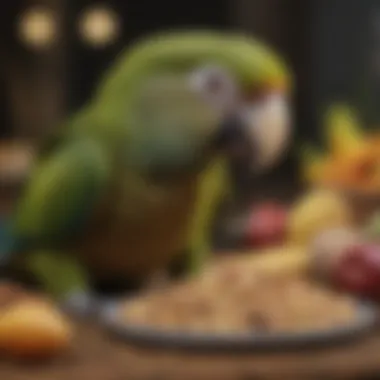
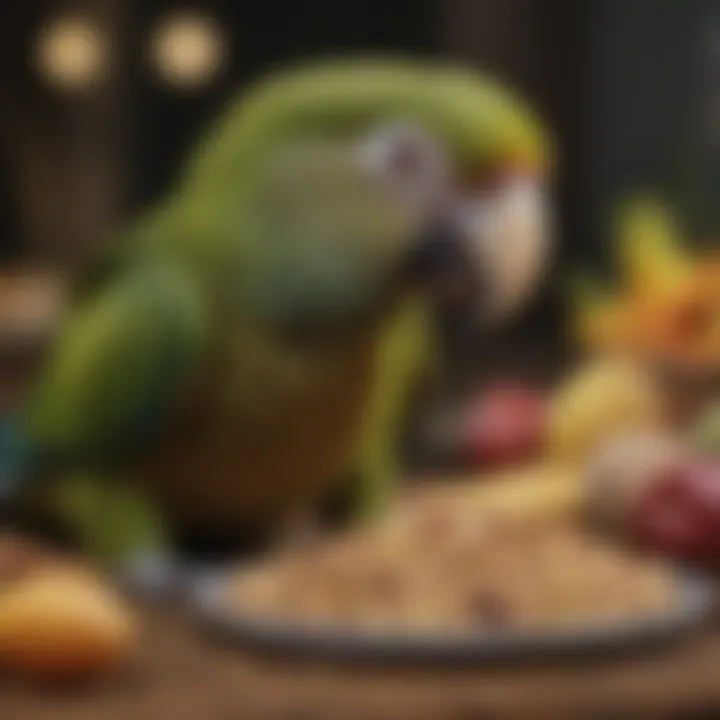
Intro
Understanding the nutritional needs of parrots is essential for their overall health. Gourmet parrot food often promises to meet these needs while offering choices that enhance their diet. This section will explore the significance of catering to your pet's specific requirements, highlighting considerations to bear in mind when selecting gourmet options. By delving into the behaviors, characteristics, and dietary essentials of parrots, owners can make informed decisions about their companions' nutrition.
Understanding Your Pet
Pet Behavior Basics
Parrots are intelligent creatures with complex behaviors. Understanding their natural instincts can help in selecting the right food. They thrive on variety and often require stimulation. A lack of engagement may lead to behavioral issues. Observing your parrot's preferences and reactions to different foods can provide insight into their tastes. Feeding routines can significantly influence a parrot’s mood and behavior.
Common Breed Characteristics
Every parrot breed has unique characteristics that influence its dietary needs. For example, African Greys may require higher levels of vitamins and minerals compared to Cockatiels. Notably, breeds like Macaws benefit from a more calorie-dense diet due to their larger size. Recognizing these details helps in tailoring meals that support each breed’s well-being.
Species-Specific Needs
Different species have varying nutritional requirements. A diet rich in fresh fruits, vegetables, and high-quality pellets is essential. Gourmet parrot food often caters to these specific needs by incorporating ingredients beneficial for distinct species. For instance, Parrots like Amazons may need more fat in their diet, while others might require additional fiber. Gathering detailed information about your chosen breed can aid in making the right food selections.
Pet Care and Maintenance
Feeding Guidelines
Gourmet parrot food should not make the entirety of your companion's diet. A balanced approach combines high-quality pellets, seeds, fruits, and vegetables. Proper feeding guidelines ensure the right quantities are administered. Always consult a vet to determine the specific needs of your parrot based on age, size, and activity level.
Grooming Essentials
Grooming is not only about aesthetics; it contributes to the health of your parrot. Regular feather care and beak maintenance are crucial. Diet plays a role here too. A balanced gourmet diet supports feather health and can reduce the need for frequent grooming.
Hygiene Practices
Keeping your parrot’s living environment clean affects their health. Regularly clean cages, food dishes, and toys. Accumulation of waste can lead to health complications. A hygienic environment, paired with good nutrition, ensures that your bird remains healthy and happy.
Health and Wellness
Routine Vet Check-ups
Regular veterinary visits are vital. Vets can spot issues that may not be apparent. They will also provide personalized dietary advice suitable for your bird. Keeping a consistent check-up schedule gives you peace of mind.
Vaccination Needs
Like any pet, parrots require vaccinations. Speak with your vet to understand which shots are recommended. Proper vaccination protects against diseases that could impact their quality of life.
Recognizing Signs of Illness
Being observant is key. Signs like changes in behavior or appetite could indicate health problems. Early detection is crucial. A healthy diet, including gourmet foods, can provide support in maintaining overall wellness.
Enrichment and Activities
Indoor vs.
Outdoor Activities
Parrots are dynamic creatures. Providing opportunities for them to engage in activities is essential for their mental and physical well-being. Indoor play may include climbing structures or swinging toys, while outdoor activities can include supervised flights or exploring safe spaces.
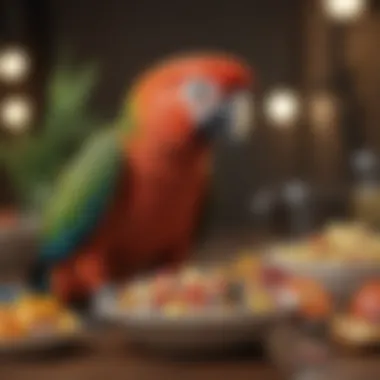
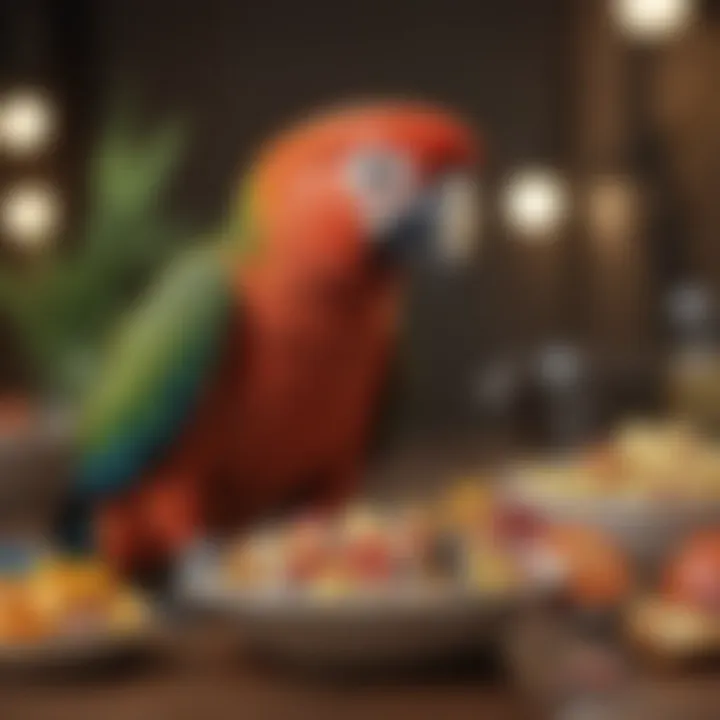
Interactive Toys and Games
Puzzle toys can keep parrots entertained and mentally stimulated. They promote natural foraging behaviors and can support additional activity along with gourmet feeding options. Select toys that challenge them while ensuring safety.
Socialization Opportunities
Parrots are social animals. Regular interaction with humans or other birds is necessary. Socialization can come from being handled or simply being in the same room with family members. These connections can be enhanced by sharing gourmet food experiences during interactions.
Proper nutrition, tailored care, and enrichment activities combine to ensure a fulfilling life for your parrot.
Choosing the right gourmet food along with understanding your pet's needs lays a foundation for a healthy, engaging environment.
Preface to Gourmet Parrot Food
The realm of gourmet parrot food is essential for avian companions, offering them a diet tailored to meet their unique nutritional needs. A well-balanced diet significantly contributes to a parrot's health, behavior, and overall quality of life. In this section, we will define what gourmet parrot food is and discuss the importance of quality nutrition for these intelligent and social birds.
Defining Gourmet Parrot Food
Gourmet parrot food refers to high-quality, thoughtfully formulated diets that prioritize the health and wellness of parrots. Unlike standard bird feeds, which may contain fillers or low-nutritional value ingredients, gourmet options often include a variety of premium, whole-food ingredients. This can include a selection of seeds, nuts, fruits, and vegetables, designed to mimic a parrot's natural diet in the wild. The aim is to provide the bird with the essential nutrients necessary for growth, reproduction, and daily well-being. Developers of gourmet food prioritize sourcing organic and non-GMO ingredients whenever possible.
Importance of Quality Nutrition for Parrots
Quality nutrition plays a pivotal role in the development and maintenance of a parrot's health. Insufficient or imbalanced diets can lead to various health issues, including obesity, feather problems, and reduced lifespans. Parrots are highly active creatures that require a wide spectrum of nutrients to thrive. These nutrients often include vitamins, minerals, fats, and proteins.
- Vitamins and Minerals: Vital for immune function and metabolic processes.
- Fats: Important for energy and nutrient absorption.
- Proteins: Crucial for tissue development and repair.
A diet rich in high-quality ingredients not only supports physical health but also enhances cognitive function and behavioral stability. Parrots are notorious for their high intelligence; therefore, proper nutrition contributes to their mental health and reduces the likelihood of stress-related habits.
Quality matters. Providing gourmet parrot food ensures that your bird receives the highest standard of nutrition, which in turn supports a longer and healthier life.
In summary, understanding gourmet parrot food and its benefits is essential for any parrot owner. Ignoring the nutritional needs of these animals is a disservice that can lead to numerous health complications. As this article unfolds, we will dive into the specifics of parrot nutrition and explore different types of gourmet food available in the market.
Understanding Parrot Nutrition
Nutrition is a vital aspect of maintaining the health of parrots. Understanding parrot nutrition ensures that their dietary needs are met, which can lead to happier and healthier birds. Proper nourishment helps prevent various health issues and supports overall well-being. This section will elaborate on the essential nutrients that parrots require, as well as common nutritional deficiencies that may arise.
Essential Nutrients for Parrots
Parrots require a diverse range of nutrients for optimal health. These nutrients include proteins, fats, carbohydrates, vitamins, and minerals. Each plays a specific role in their development and daily function.
- Proteins: Essential for growth, tissue repair, and the production of feathers. Protein sources include legumes, quinoa, and certain seeds.
- Fats: Provide energy and aid in nutrient absorption. Healthy fats from sources like nuts and seeds are important, but quantity must be regulated to avoid obesity.
- Carbohydrates: Serve as the primary energy source. Fruits, whole grains, and vegetables can fulfill this need effectively.
- Vitamins: Vital for various bodily functions. Vitamins A, C, D, E, and K are particularly important for feathers, immune function, and overall health.
- Minerals: Essential for bone health, muscle function, and more. Calcium, phosphorus, and magnesium should be supplemented in their diet for balance.
By ensuring that these nutrients are present in your parrot's diet, you contribute to their long-term health and vitality.
Common Nutritional Deficiencies
Despite the wealth of available foods, parrots can still suffer from specific nutritional deficiencies that can lead to serious health problems. Parrot owners must be vigilant in offering a balanced diet. Some common deficiencies include:
- Vitamin A Deficiency: This can result in issues like poor feathering and respiratory problems. Symptoms may be dry eyes and a weakened immune system. Foods high in vitamin A include carrots, sweet potatoes, and dark leafy greens.
- Calcium Deficiency: This is particularly concerning for breeding birds but affects all parrot species. It can lead to weak bones and egg binding in females. Fruits such as figs and vegetables like kale can help supplement their calcium intake.
- Iron Storage Disease: While some iron is essential, excess levels can lead to health issues, especially in certain parrot breeds. This emphasizes the need for a balanced diet that avoids over-supplementation.
Awareness of these deficiencies allows parrot owners to adjust their feeding practices, ensuring a comprehensive and balanced diet.
Nutrition is not just about filling a bowl with food but understanding the diverse needs of your parrot.
Types of Gourmet Parrot Food
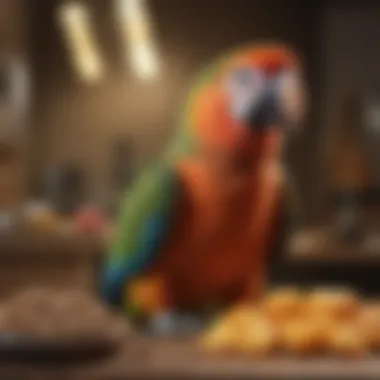
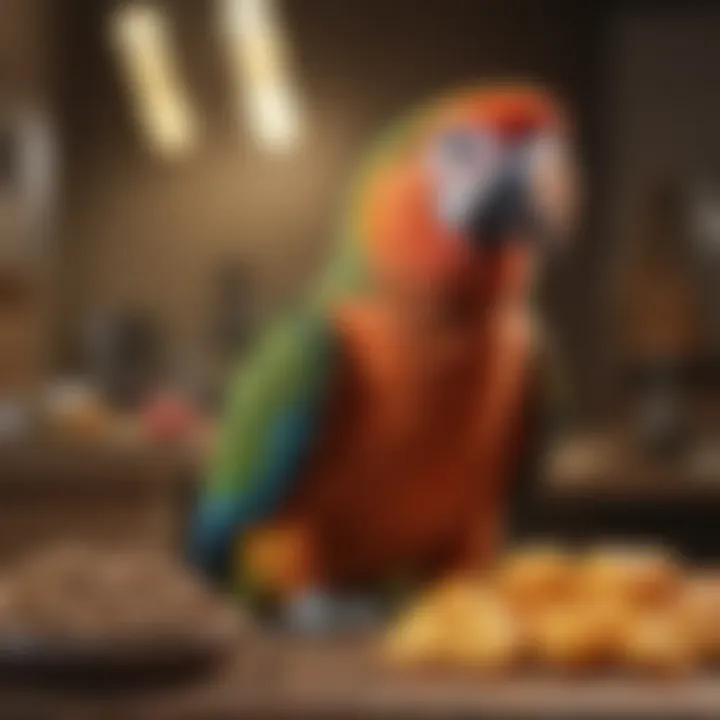
Understanding the various types of gourmet parrot food is critical for ensuring optimal nutrition for your feathered companions. Each category of food provides distinct benefits and caters to different dietary needs. It's essential for owners to recognize that not all gourmet options are equal. Choosing the right type can lead to improved health and overall well-being for parrots. Here, we will explore the main classifications: seed-based gourmet foods, pelleted gourmet foods, fresh food offerings, and specialty gourmet treats.
Seed-based Gourmet Foods
Seed-based gourmet foods are often a staple in many parrot diets. They offer a variety of seeds that are both enjoyable and nutritious for birds. These seeds typically include sunflower, safflower, flaxseed, and millet. One of the primary benefits of seed-based food is the natural appeal. Parrots naturally forage for seeds in the wild, so these foods can mimic their natural feeding behaviors. However, while seeds are a valuable source of energy and essential fats, relying solely on them can lead to nutritional imbalances. Therefore, it is advised to incorporate a wider range of foods to ensure a balanced diet.
Pelleted Gourmet Foods
Pelleted gourmet foods are another popular choice among parrot owners. These foods are specially formulated to provide all the essential nutrients that parrots require. Each pellet typically contains a precise balance of carbohydrates, proteins, vitamins, and minerals tailored to meet the dietary needs of birds. The benefits of pelleted foods include reducing selective feeding, which occurs when parrots pick and choose only their favorite seeds. Additionally, pelleted foods often come in varied formulations, such as those specifically for different species of parrots. This ensures that each type of parrot receives the appropriate nutrients for its unique needs.
Fresh Food Offerings
Fresh food offerings are an excellent way to add variety and freshness to a parrot's diet. These foods usually include fruits, vegetables, and leafy greens. Fresh produce provides essential vitamins, minerals, and antioxidants. For instance, carrots, broccoli, apples, and berries are known to be beneficial. In contrast to processed foods, fresh offerings promote hydration and can enhance the overall health of your bird. Parrots often enjoy the textures and flavors of fresh food, stimulating their natural foraging instincts. However, it is vital to wash all produce thoroughly and remove any harmful seeds.
Specialty Gourmet Treats
Specialty gourmet treats can be a rewarding addition to your parrot's diet. These treats often include high-quality ingredients such as nuts, dried fruits, or specially formulated snacks. They are designed to serve as rewards or enrichment, making training sessions more engaging. However, treats should be given sparingly to prevent overfeeding. Some owners may mistakenly believe that all treats are detrimental; however, when chosen mindfully, they can enhance the bird’s experience and relationship with its owner.
Avian nutrition is complex, and understanding the various food types available is key for the health of your parrot. A balanced diet involves more than just one type of food, so consider combining different types for comprehensive nutrition.
In summary, selecting the right mixture of gourmet parrot foods is fundamental. Whether it's seed-based, pelleted, fresh, or specialty treats, each option has its advantages and should be considered carefully. Remember, a varied diet contributes significantly to the health and happiness of your avian companion.
Benefits of Gourmet Parrot Food
Gourmet parrot food offers numerous advantages that transcend basic nutritional requirements. Providing high-quality ingredients can profoundly impact the overall health and wellness of parrots. Parrot owners who understand these benefits can make better choices for their companions. The ensuing subsections will delve into specific benefits, including enhanced health and longevity, positive behavioral changes, and targeted support for specific health conditions.
Enhanced Health and Longevity
Feeding parrots a gourmet diet significantly contributes to their health and lifespan. Gourmet foods are often rich in essential vitamins, minerals, and beneficial fatty acids. These nutrients support various bodily functions, from immune health to feather quality. Parrots fed with quality gourmet foods consistently show signs of increased vitality. Their feathers may become more vibrant and their energy levels boosted, leading to a more active lifestyle.
A vital aspect of enhanced health in parrots is the prevention of chronic diseases. High-quality diets can minimize the risk of conditions such as obesity, liver disease, and vitamin deficiencies. These ailments are common in parrots with poorly balanced diets. By ensuring they consume gourmet options, owners can take proactive measures in maintaining their parrot's overall health.
Most importantly, regular diet that includes gourmet parrot food can lead to a longer, healthier life. Parrots thrive when nourished with the right mix of proteins, carbohydrates, and fats. As a result, a gourmet diet does not just aid in prolonging their lives but enhances their quality throughout.
Positive Behavioral Changes
The link between a bird's diet and its behavior is notable. Gourmet parrot food often leads to positive behavioral shifts. Parrots that receive proper nutrition are typically more engaged and sociable. They are less prone to stress and behavioral issues like feather plucking or aggression.
A well-balanced diet doesn’t merely control physical health; it also influences mood and psychological well-being. Culinary variety in gourmet diets sparks curiosity and offers mental stimulation. Birds are naturally curious creatures, and feeding them diverse ingredients encourages exploration and play.
Owners might observe improved interaction during bonding activities when their parrots enjoy high-quality foods. This connection benefits both parties and fosters a more harmonious home environment. Nutritionally rich foods can indeed make a significant difference in a parrot's demeanor.
Support for Specific Health Conditions
Some parrots have particular health needs based on age, species, or pre-existing conditions. Gourmet parrot food can be tailored to accommodate these needs. Certain brands produce specialized formulas that address health issues like obesity, feather problems, or gastrointestinal disorders.
For instance, gourmet options that include specific fibers aid in digestion and prevent obesity. Ingredients such as omega-3 fatty acids may support heart health or boost immune functions. This targeted approach in dietary planning can be essential for recovery from illness or to enhance overall health.
In summary, gourmet parrot food not only enhances general health and longevity but also positively influences behavior and addresses specific health concerns. Providing an optimal diet is a fundamental responsibility that significantly impacts your avian companion’s quality of life.
Selecting the Right Gourmet Food
Selecting the right gourmet food for your parrot is critical. The well-being of your avian companion largely depends on the nutrition you provide. A proper diet ensures a robust immune system and helps prevent various health problems. Thus, understanding how to choose high-quality gourmet food can significantly impact your parrot's happiness and longevity.
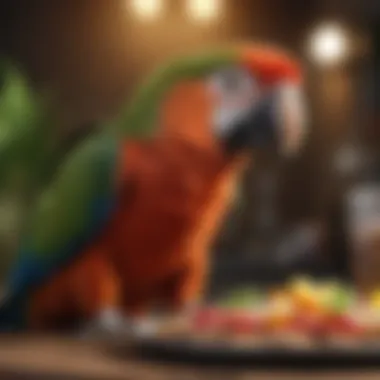
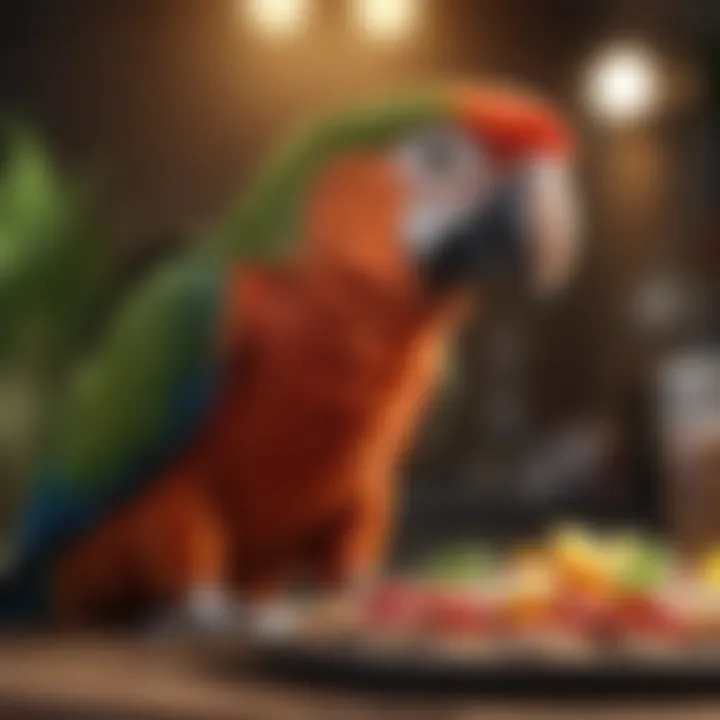
Reading Labels and Understanding Ingredients
When you go to the pet store, you will notice numerous brands of gourmet parrot food. Reading the labels is essential. It allows you to see precisely what you're feeding your parrot. Ingredients are listed in a specific order, from the most prevalent to the least. Protein sources, such as chicken or peanuts, should be near the top of the list. Whole grains, vegetables, and fruits should also feature prominently. Look for products that emphasize natural ingredients and avoid those loaded with fillers or artificial colors.
Additionally, be cautious of terms like "organic" or "natural." While appealing, these labels do not always guarantee quality or nutritional value. Research the brands to ensure their claims align with your standards. Knowing what to look for can help you make informed choices that suit your parrot’s dietary needs.
Avoiding Harmful Additives
Many gourmet parrot foods contain additives that can be detrimental to your pet's health. Preservatives, artificial flavors, and sweeteners are common in some products. These additives may improve the taste or shelf-life of the food but can have adverse effects on your parrot's health in the long run. Avoid foods that list ingredients like BHT, BHA, or propylene glycol. Instead, select options made with whole, minimally processed ingredients. Always aim for brands that prioritize the health of your pet over profit.
Common Misconceptions
Misconceptions about gourmet parrot food can lead to poor nutritional decisions when feeding avian companions. Addressing these misconceptions is vital for bird owners to ensure the health and longevity of their pets. Many people may assume that gourmet food is unnecessary or simply a marketing ploy, while others believe that all parrots will automatically enjoy these higher-quality options. Both beliefs can have repercussions on a parrot’s dietary habits and overall well-being.
Gourmet Food Is Just a Marketing Gimmick
Some pet owners view gourmet parrot food as merely a gimmick designed to increase profits for manufacturers. However, the term
Incorporating Gourmet Food into Your Parrot's Diet
Incorporating gourmet food into your parrot's diet is an essential aspect of enhancing their overall health and well-being. As pet owners, understanding how to properly introduce high-quality foods can make a significant difference in your bird's nutritional intake. Gourmet food is not just a luxury; it serves as a vital part of a balanced diet for your avian companions. It can provide a range of benefits, from improved feather quality to increased energy levels.
The process of integrating gourmet foods requires careful thought and consideration. This guide will explore two main aspects: the gradual introduction of new foods and the importance of balancing gourmet options with other dietary components. By considering these elements, you can create a nourishing environment that supports your parrot’s dietary needs.
Gradual Preludes to New Foods
When adding gourmet foods to your parrot’s diet, it is crucial to do so gradually. Sudden changes in diet can lead to digestive issues or refusal to eat new foods altogether. Start by presenting small amounts of the gourmet food alongside their regular diet. Monitor their reactions closely. If your parrot shows interest, slowly increase the proportion of gourmet food over a period of days or weeks.
During this transition, observe for any adverse reactions. Look for signs such as changes in droppings, feather plucking, or appetite loss. These could indicate that the new food does not agree with your bird. It's essential to remain patient and give your parrot time to accustom to the new flavors and textures. Incorporating a variety of gourmet foods can aid in maintaining their curiosity and encourage them to try new things.
In addition, you might consider using different presentation methods. For instance, offering fresh fruits or vegetables in a foraging toy can make it more appealing. Moreover, while introducing gourmet foods, keep their other diet components consistent. This approach provides a sense of stability for your parrot, which can alleviate stress during transitions.
Balancing Gourmet Foods with Other Diet Components
Achieving a well-rounded diet for your parrot means balancing gourmet foods with other necessary dietary components. While gourmet foods can offer unique nutritional benefits, a diverse diet is essential to meet all their nutritional needs. Ensure that their meals include a mix of seeds, pellets, fresh fruits, and vegetables. This diversity helps avoid potential deficiencies.
Gourmet options can be rich in essential vitamins, minerals, and fatty acids. However, they might also lack certain nutrients that other foods provide. Therefore, it’s important to understand the nutritional profile of what you are feeding. Some gourmet foods may contain higher fat levels, which could lead to obesity if served in excess without moderation.
A balanced approach involves calculating the portion sizes appropriately. Be mindful of caloric intake from gourmet treats or meals compared to other diet elements. Remember that each bird is unique. Age, activity level, and health condition can influence dietary needs.
Key Considerations:
- Monitor weight and health for adjustments.
- Consult with an avian vet for personalized advice.
- Observe your bird's preferences to find a balance that works.
In summary, incorporating gourmet food into your parrot's diet offers potential benefits. However, doing it correctly is crucial. A gradual introduction and maintaining a balanced dietary approach ensures that your feathered friend enjoys a variety of flavors while receiving essential nutrients.
Epilogue
Continued education on avian nutrition is paramount for pet owners who aim to provide the best care for their parrots. As understanding of avian dietary needs evolves, so must the approaches of those responsible for these intelligent creatures. The importance of ongoing learning cannot be overstated.
Incorporating gourmet parrot foods into a bird’s diet is a significant step towards ensuring optimal health. However, knowing the specific nutritional requirements and potential gaps is equally vital. Parrots are not just pets; they are complex animals whose well-being depends on proper nutrition. Continued education allows caregivers to stay informed about these needs.
The Importance of Continued Education on Avian Nutrition
Education on avian nutrition involves learning about the essential nutrients required for parrots, recognizing common deficiencies, and understanding the implications of various diets. Knowledge of these aspects can profoundly impact the health and longevity of parrots.
- Essential Nutrients: Owners should be aware of necessary vitamins, minerals, proteins, and fats, ensuring that diets reflect these needs.
- Understanding Diet Types: Familiarity with the different types of gourmet unch and how they fit into an overall balanced diet helps in making informed choices.
- Addressing Deficiencies: Regularly updating one’s knowledge aids in identifying and correcting any deficiencies that could affect a parrot’s health.
The educational journey can include workshops, reading materials, and reputable online sources. Joining communities such as forums on Reddit or educational pages on Facebook offers exchange of ideas and personal experiences.
Education is the key to unlocking a parrots true potential and health.







